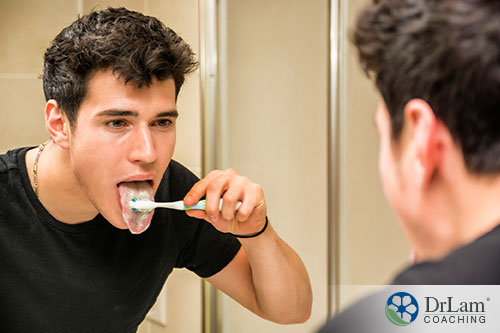Sometimes things happen beyond your control. You may live far from a town, get snowed in, be quarantined at home, or a natural disaster may strike. While essential services may stay open during these times, you may also find that no dental care facilities are open. So, what do you do?
Well, in most cases, as with most things, prevention is better than cure. In other words, when facing a prolonged period with no dental care available, you need to take the necessary steps to ensure that your teeth and gums stay healthy. So, when you know that no dental care will be available for some time, what do you do?
 When looking at these tips, you may think they are self-evident. But we often forget about them, especially when we are out of touch with the rest of the world for whatever reason. Please read through them - they will help you preserve your oral health when no dental care is around.
When looking at these tips, you may think they are self-evident. But we often forget about them, especially when we are out of touch with the rest of the world for whatever reason. Please read through them - they will help you preserve your oral health when no dental care is around.
Teeth may be hard, but they can break. Also, the hardness of your teeth largely depends on your dental and overall health.
While you may know to be wary of certain foods like bones, crab shells or even ice because biting into them could break teeth, you should also take note of other foods that could cause a tooth to chip or break. You can’t go running to have your tooth fixed when no dental care is around. So, think twice before biting down into that crusty bread, hard candy, nut, or rack of ribs.
When thinking of trauma to teeth, we tend to think of people participating in sports. A cyclist, for instance, could fall and break or lose a tooth, or a hockey player could lose some teeth if not careful while playing a game.
But the truth is, everyone is at risk of trauma to their mouth. You could slip and fall in the bathroom and chip your tooth, for instance. An exposed nerve is excruciatingly painful. And if no dental care is available, you will sit with that pain until you can have it seen to. You could hit your teeth on the hard surface of a water bottle opening and actually chip your tooth that way.
So, if you are in a situation where you cannot see a dentist for some time, please make awareness of your surroundings a priority so that accidents do not happen.
Sugar is not only bad for your teeth but for your body as well. It may contribute towards many metabolic and other health issues that force your body’s NeuroEndoMetabolic (NEM) Stress Response system to work harder at keeping you healthy. Besides sugar contributes towards such issues as adrenal fatigue, obesity, and diabetes, to name but a few.
In your mouth, sugar and carbohydrates (which quickly turn into sugar if left long in your mouth) combine with the saliva and bacteria present. Together, they form plaque on your teeth which can dissolve your tooth enamel and cause cavities.
When no dental care is available for an extended period, you may need to avoid corrosive foods and drinks like soft drinks, fruit juice, energy drinks, citrus fruits, vinegar, grapes, and pickled foods. These foods and drinks have a corrosive action on your tooth enamel and could cause cavities.
If you have false teeth, you may no longer fear cavities, you still sometimes need dental care. For example, you may get soft tissue irritation or need to go for denture adjustments.
When you cannot see your dentist for a long period, consider only wearing your dentures for eating purposes and avoiding food that needs much chewing. If your teeth need an adjustment, consider using denture adhesives that prevent your teeth from moving around and causing gum issues.
Many people suffering from stress tend to grind their teeth. This could cause tooth and gum ache. Not only that, but it also harms your body as a whole and may result in many health issues including heart disease and high blood pressure.
If you tend to grind or clench your teeth, stop doing so the moment you become aware of it. Try keeping your teeth apart to spare them. If you have a nightguard, please wear it. If, however, it no longer fits you, don't wear it because doing so could damage your teeth.
The inflammation associated with infection is a sign that your NEM is working at healing you. However, if your NEM has to work for a long time to address chronic inflammation, you could end up with a condition called adrenal fatigue that has many different symptoms. In order to avoid inflammation and infection, it is important to take care of your teeth and gums. Be sure to brush and floss several times a day.
In most cases, a mouth infection results from tooth decay that reaches a nerve. Inflammation of the gums is called gingivitis. You could get temporary relief from infection by taking a prescription antibiotic. You may be able to obtain this through telemedicine. However, if you cannot get to a dentist, you may also not be able to get to a doctor either. Rinsing your mouth with salt and water a few times a day could help until you can get the problem seen to.
 Don’t forget to brush your tongue, because plaque that sits on your tongue leads to bad breath.
Don’t forget to brush your tongue, because plaque that sits on your tongue leads to bad breath.If you are worried about oral health issues, here are a few things you can do.
Taking care of your teeth when no dental care is available is not as difficult as you think. Implementing these tips can promote your overall dental health as well as helping you maintain dental health until you can see a dentist.
If you would like to know more about what to do when no dental care can be found, especially if you suffer from severe stress, the team at Dr. Lam Coaching can help. We offer a free** no-obligation phone consultation at +1-626-571-1234 where we will privately discuss your symptoms and various options. You can also send us a question through our Ask The Doctor system by clicking here.
© Copyright 2020 Michael Lam, M.D. All Rights Reserved.
Yes. Flossing will help maintain oral health when no dental care is available. It may help protect your teeth and gums from infection while getting rid of food particles between your teeth that could cause oral health issues such as inflammation, cavities, and bad breath.
